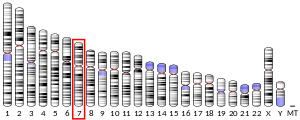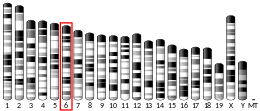ST7
Suppressor of tumorigenicity protein 7 is a protein that in humans is encoded by the ST7 gene.[5][6][7] ST7 orthologs [8] have been identified in all mammals for which complete genome data are available.
| ST7 | |||||||||||||||||||||||||
|---|---|---|---|---|---|---|---|---|---|---|---|---|---|---|---|---|---|---|---|---|---|---|---|---|---|
| Identifiers | |||||||||||||||||||||||||
| Aliases | ST7, ETS7q, FAM4A, FAM4A1, HELG, RAY1, SEN4, TSG7, suppression of tumorigenicity 7 | ||||||||||||||||||||||||
| External IDs | OMIM: 600833 MGI: 1927450 HomoloGene: 10185 GeneCards: ST7 | ||||||||||||||||||||||||
| |||||||||||||||||||||||||
| |||||||||||||||||||||||||
| Orthologs | |||||||||||||||||||||||||
| Species | Human | Mouse | |||||||||||||||||||||||
| Entrez | |||||||||||||||||||||||||
| Ensembl | |||||||||||||||||||||||||
| UniProt | |||||||||||||||||||||||||
| RefSeq (mRNA) |
| ||||||||||||||||||||||||
| RefSeq (protein) |
|
| |||||||||||||||||||||||
| Location (UCSC) | Chr 7: 116.95 – 117.23 Mb | Chr 6: 17.69 – 17.94 Mb | |||||||||||||||||||||||
| PubMed search | [3] | [4] | |||||||||||||||||||||||
| Wikidata | |||||||||||||||||||||||||
| |||||||||||||||||||||||||
Function
The gene for this product maps to a region on human chromosome 7 identified as an autism-susceptibility locus. Mutation screening of the entire coding region in autistic individuals failed to identify phenotype-specific variants, suggesting that coding mutations for this gene are unlikely to be involved in the etiology of autism. The function of this gene product has not been determined. Transcript variants encoding different isoforms of this protein have been described.[7]
Interactions
ST7 has been shown to interact with ITGB1BP3[9] and GNB2L1.[9]
References
- GRCh38: Ensembl release 89: ENSG00000004866 - Ensembl, May 2017
- GRCm38: Ensembl release 89: ENSMUSG00000029534 - Ensembl, May 2017
- "Human PubMed Reference:". National Center for Biotechnology Information, U.S. National Library of Medicine.
- "Mouse PubMed Reference:". National Center for Biotechnology Information, U.S. National Library of Medicine.
- Ogata T, Ayusawa D, Namba M, Takahashi E, Oshimura M, Oishi M (October 1993). "Chromosome 7 suppresses indefinite division of nontumorigenic immortalized human fibroblast cell lines KMST-6 and SUSM-1". Molecular and Cellular Biology. 13 (10): 6036–43. doi:10.1128/mcb.13.10.6036. PMC 364663. PMID 8105370.
- Zenklusen JC, Rodriguez LV, LaCava M, Wang Z, Goldstein LS, Conti CJ (November 1996). "Novel susceptibility locus for mouse hepatomas: evidence for a conserved tumor suppressor gene". Genome Research. 6 (11): 1070–6. doi:10.1101/gr.6.11.1070. PMID 8938430.
- "Entrez Gene: ST7 suppression of tumorigenicity 7".
- "OrthoMaM phylogenetic marker: ST7 coding sequence".
- Battle MA, Maher VM, McCormick JJ (June 2003). "ST7 is a novel low-density lipoprotein receptor-related protein (LRP) with a cytoplasmic tail that interacts with proteins related to signal transduction pathways". Biochemistry. 42 (24): 7270–82. doi:10.1021/bi034081y. PMID 12809483.
Further reading
- Zenklusen JC, Weitzel JN, Ball HG, Conti CJ (July 1995). "Allelic loss at 7q31.1 in human primary ovarian carcinomas suggests the existence of a tumor suppressor gene". Oncogene. 11 (2): 359–63. PMID 7624150.
- Zenklusen JC, Thompson JC, Troncoso P, Kagan J, Conti CJ (December 1994). "Loss of heterozygosity in human primary prostate carcinomas: a possible tumor suppressor gene at 7q31.1". Cancer Research. 54 (24): 6370–3. PMID 7987830.
- Zenklusen JC, Bièche I, Lidereau R, Conti CJ (December 1994). "(C-A)n microsatellite repeat D7S522 is the most commonly deleted region in human primary breast cancer". Proceedings of the National Academy of Sciences of the United States of America. 91 (25): 12155–8. doi:10.1073/pnas.91.25.12155. PMC 45395. PMID 7991599.
- Folstein SE, Mankoski RE (August 2000). "Chromosome 7q: where autism meets language disorder?". American Journal of Human Genetics. 67 (2): 278–81. doi:10.1086/303034. PMC 1287175. PMID 10889044.
- Vincent JB, Herbrick JA, Gurling HM, Bolton PF, Roberts W, Scherer SW (August 2000). "Identification of a novel gene on chromosome 7q31 that is interrupted by a translocation breakpoint in an autistic individual". American Journal of Human Genetics. 67 (2): 510–4. doi:10.1086/303005. PMC 1287197. PMID 10889047.
- Zenklusen JC, Conti CJ, Green ED (April 2001). "Mutational and functional analyses reveal that ST7 is a highly conserved tumor-suppressor gene on human chromosome 7q31". Nature Genetics. 27 (4): 392–8. doi:10.1038/86891. PMID 11279520.
- Brown VL, Proby CM, Barnes DM, Kelsell DP (July 2002). "Lack of mutations within ST7 gene in tumour-derived cell lines and primary epithelial tumours". British Journal of Cancer. 87 (2): 208–11. doi:10.1038/sj.bjc.6600418. PMC 2376116. PMID 12107844.
- Vincent JB, Petek E, Thevarkunnel S, Kolozsvari D, Cheung J, Patel M, Scherer SW (September 2002). "The RAY1/ST7 tumor-suppressor locus on chromosome 7q31 represents a complex multi-transcript system". Genomics. 80 (3): 283–94. doi:10.1006/geno.2002.6835. PMID 12213198.
- Dong SM, Sidransky D (September 2002). "Absence of ST7 gene alterations in human cancer". Clinical Cancer Research. 8 (9): 2939–41. PMID 12231539.
- Wang S, Mori Y, Sato F, Yin J, Xu Y, Zou TT, Olaru A, Kimos MC, Perry K, Selaru FM, Deacu E, Sun M, Shi YC, Shibata D, Abraham JM, Greenwald BD, Meltzer SJ (January 2003). "An LOH and mutational investigation of the ST7 gene locus in human esophageal carcinoma". Oncogene. 22 (3): 467–70. doi:10.1038/sj.onc.1206125. PMID 12545169.
- Battle MA, Maher VM, McCormick JJ (June 2003). "ST7 is a novel low-density lipoprotein receptor-related protein (LRP) with a cytoplasmic tail that interacts with proteins related to signal transduction pathways". Biochemistry. 42 (24): 7270–82. doi:10.1021/bi034081y. PMID 12809483.
- Sivasundaram K, Suzuki H, Seto M, Hosokawa Y (2004). "Mutational analysis of the ST7 gene in human myeloid tumor cell lines". Oncology Reports. 10 (6): 1737–9. doi:10.3892/or.10.6.1737. PMID 14534688.
- Lu C, Xu HM, Ren Q, Ao Y, Wang ZN, Ao X, Jiang L, Luo Y, Zhang X (December 2003). "Somatic mutation analysis of p53 and ST7 tumor suppressor genes in gastric carcinoma by DHPLC". World Journal of Gastroenterology. 9 (12): 2662–5. doi:10.3748/wjg.v9.i12.2662. PMC 4612027. PMID 14669308.
- Liu J, Gough J, Rost B (April 2006). "Distinguishing protein-coding from non-coding RNAs through support vector machines". PLoS Genetics. 2 (4): e29. doi:10.1371/journal.pgen.0020029. PMC 1449884. PMID 16683024.




